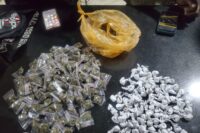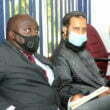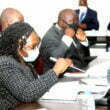CHIEF Government Spokesperson Dora Siliya says every country has bad people, thieves and the corrupt but that does not mean corruption should be turned into a daily song.
And Siliya says Zambians must unite and stop using the courts of law to politic on “imaginary corruption”.
Meanwhile, Siliya, who doubles as Information and Broadcasting Minister, says some of the COVID-19 donations of materials have been channelled to health staff while others are being stocked for future use.
Speaking on ZNBC Radio 2 Special Interview programme, Thursday, Siliya said corruption should not become a song that an individual sings every time.
“As a country, we must come out of this pandemic as a better people. Let us not be a people that always say ‘Zambia is bad’ because the pandemic has shown us that there is nowhere where it is better. Everybody now is routing for their own country. Like Mahatma Gandhi said, ‘be the change you want to see,’ don’t point fingers, point yourself! What have you done yourself for your country?” Siliya asked.
“Yes, in every country, there are bad people; in every country, there might be thieves; in any country, there may be corrupt people. But it should not become a song in this country where whenever everyone opens their mouth, it is the pedestrian argument of corruption. We must be able to discuss and debate things at a deeper-level so that we can understand ourselves and see what challenge we can address. If every time we are going to open our mouths, it’s just corruption, who is going to eat corruption? Our children definitely won’t!”
She added that Zambia had strong laws that supported the fight against corruption and that citizens should not use the courts to politic on “imaginary corruption”.
“When corruption happens in this country, we don’t fail to deal with it; it doesn’t matter at what level, we do not fail to deal with it. Let us not use our court processes for just politicking about corruption because what people don’t understand is that, when we take fake cases to the courts, it is the Zambian people paying for that process,” Siliya said.
“If you are worrying right now during the Coronavirus [pandemic] that your family is suffering, do you want government to be spending more money on wasting resources on issues that are imaginary? Even with these donations to government, whether it’s through DMMU or whether it is through the Ministry of Health or whichever government organization, there are laws in place. The Auditor General is busy everywhere auditing ensuring that everything received is accounted for. We must have belief in those institutions.”
And Siliya said technocrats in the Ministry of Health had advised government on the need for COVID-19 donations of materials to be channelled to health personnel, while others needed to be stocked for future eventualities.
“…we have to prepare for an eventuality. Doctors are telling us that some of these PPEs, we need to keep and stock them because if the numbers move overnight, just suddenly, you find that you have 1,000 cases, you need to have a management system, including PPEs, to ensure that we can manage 1,000 people at once. So, please, people, these things are being looked after as it should be, according to the rules for those who went to school, who studied these things, this is what they are telling us,” Siliya said.
Meanwhile, Siliya, who is also Petauke Central PF member of parliament, said the indications that the country was recording high cases should give confidence to Zambians that government was working well to fight the pandemic.
“I think we have done very well since the first case of coronavirus on the 18th of March. We have been quite stable and I have only seen an upsurge in the last few weeks or so. The reason is very clear: government put in place information so Zambians responded very quickly; I mean, I am so happy to see every one wearing masks. In terms of the management of the diseases; in terms of the case management of those who were actually sick, government has done well. We have a low rate of people who have died. We have a very high recovery rate, over 124 people and we had very few cases in the hospital until Nakonde [cases came up],” she said.
“We should be very afraid we are a land-locked country; this disease can be imported, [but] we should be very happy that your government is working because the reason we are finding these cases is that we have taken test kits to border towns. If the country did not have these tests kits, these cases, we would not know about, that would even be more dangerous! The fact we are getting these high numbers of cases from Nakonde because of our neighbouring countries where their management regime is different from us, should give Zambians confidence that government is doing the right thing and has deposited resources, financial, human resources, to ensure that the work that needs to be done in border towns is being done.”
Siliya added that government would not allow any usage of medication that had not been approved by the World Health Organization (WHO) to treat COVID-19.
“At this time in Zambia, we are using only a cocktail, different medication. If you have a headache, we will give you Panadol; if you have fever, we will give you Chloroquine for malaria. These are medications for other diseases, they are just giving you to help you…So, what we are hearing in Madagascar, Senegal, we are just hearing until the WHO tells us that, ‘we have found the medication’; wherever it comes from, it doesn’t matter. Even here in Zambia, we have researchers busy in labs searching for the medication,” she said.
Siliya reiterated that Zambia would not close its borders despite the fear of rising imported cases because the country was still heavily dependent on imported goods.
“We have to balance with the health issues and the economic demand. Yes, we are all terrified of the Coronavirus because the virus does not move, it is people who move it. At the same time, we love our children so much that we want them to eat so we have to make this balance. Are we going to lock the door and stay in the house?” wondered Siliya.
“Government did not close borders, but government said, ‘let us suspend all international flights.’ We closed all airports and left the (Kenneth Kaunda) International Airport in Lusaka because in Zambia, even though there is this disease, we need to import medicine; we need to import masks; we need to import protective materials for doctors; we need to import these test kits for this disease. So, we can’t close borders because if we close the borders, how are we going to get test kits? The Tanzanian border is where our fuel comes from.”













9 Responses
A daily song will remind you who you are and lead you to repentance if you are normal, do you want us to stay quiet while you empty the country’s coffers? Is that not what happened in MMD where you are coming from? after declaring Zambia a Christian nation, you asked everyone to close their eyes and pray while you mercilessly dipped your dirty and long fingers in GRZ coffers?
I wish I was the one interviewing you siliya…… Coz I want to find out if you don’t know the same song…. Because all we know is that the song won’t stop anytime soon because u are still writing the verses.
Unless you decide to clear the atmosphere with all what has been happening, the song will not stop playing
Fire trucks
48 houses
Third term
Bill 10
Mukula
Prime tv
Gassing and shootings
I tell you Dora the list is endless.
Guys let’s keep singing this song Dora’s Lamentations shows that the song has started to taunt thieves like her self. It is only in this country where thieves are shielded from being prosecuted by the powers that be. What laws is this corrupt minister talking about? Is not that man at the helm of fighting covid 19 facing corruption charges and yet he is arrogantly calling innocent Zambians lunatics. There are no laws in this county there are just cosmetic laws.
Where do you live, or are you blind or you just don’t want to see, as the Nigerians would say? Like Mr. Zulu and the other have said. This song will continually be sang until it blows up your eardrums. You are talking of material donations like the PPEs, because these cannot be sold to anyone so they are of no use to those thieves. Can you tell us how much money has been donated and how it is being spent. Mr. Zulu has sport out an endless list of corrupt actions that have taken place and counting, but you still argue. Ministry of Health personnel recently revealed that from the millions that have been donated. Only about 5million might be accommodated for the pandemic and bulk has disappeared. Denying corruption when it is straight in your face only reveals total mental retardation.
Woooooh…..what a justification.! Theft doesn’t build integrity bwana minister.
It is ludicrous to think that when you commit wrongs against your people, they should sit back, relax and cheer you on. What nonsense?! Even the reported pay cuts by Adada and his cronies, if that’s anything to go by, counts for nothing, compared to the loot of our national resources. Do these guys think God doesn’t see their sleazy schemes. They stash millions of dollars from national coffers and they think God gives them a thumbs up- ‘well done my children’ only a fool will think so. We won’t stop singing because that will be celebrating mediocrity.
Ok. So we agree there are thieves. Now if we can agree that thieves dont belong in positions of power, I think resolution can be achieved
This one is an example of a qualified person, not educated. Her education has failed to transform her natural corrupt brains….
Thieves are not supposed to hold any public office, their place is in prison really no one wants to hear that language as it is troubling to the hearts of Zambians please give us a break.